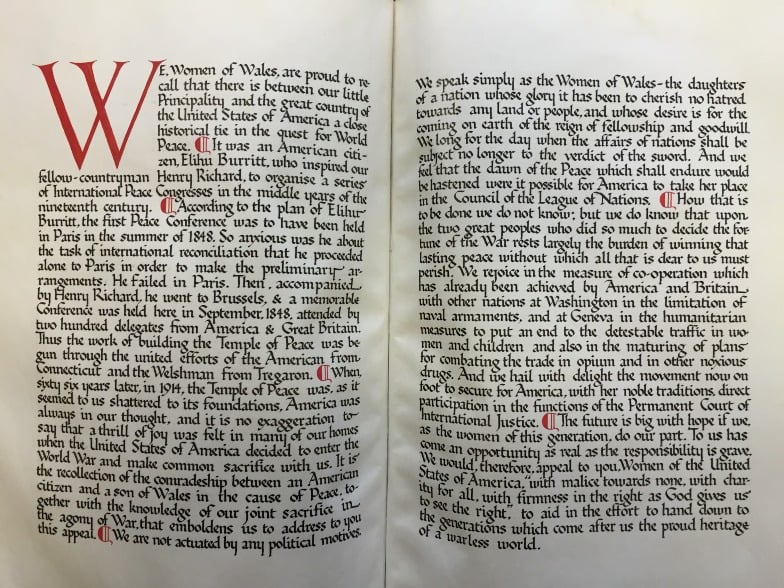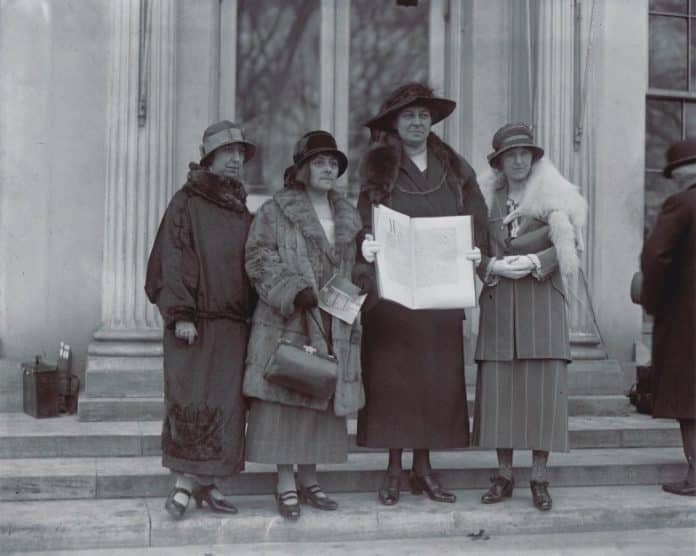In 1923, the women of Wales took part in an unprecedented appeal: 390,296 women, representing 30% of the nation’s female population at the time, signed a peace petition calling on the United States to join and lead the League of Nations.
The campaign represented a bold movement to champion equality through elevating the voices of women to the international stage.
Now, a century later, volunteers and community groups in Wales have unearthed this inspiring tale of peace and women’s empowerment.
An outpouring of grief after the horrors of war

The peace movement among the women of Wales grew from the ashes of the First World War. Organised through the Welsh League of Nations Union, the petition appealed to the women of America: “We long for the day when the affairs of Nations shall be subject no longer to the verdict of the sword. And we feel that the dawn of the peace which shall endure would be hastened were it possible for America to take her place in the Council of the league of nations.”
The Wales-wide effort to galvanise signatures involved almost every household in the country, with peace activists going door-to-door in a campaign of “absolute determination,” according to Ffion Fielding, Project Manager for the Women’s Peace Petition Project at the Welsh Centre for International Affairs.
“It was deliberately inclusive to gain as many signatures as possible […] from women across Wales, from all backgrounds, all political persuasions,” she adds.
The response to the petition was unprecedented for the time. Suffrage – the right to vote – had recently been extended to ‘propertied women’ in 1918, but did not reach most Welsh women until 1928.
The impact of the horrors of the First World War was one of the main reasons behind the overwhelming response, says Ffion Fielding.
“There wasn’t a single family in Wales that hadn’t been affected in some way through grief following the First World War,” she notes. “[It was a] collective action around grief that possibly people didn’t feel they had had a chance to express in another way.”
As the declaration read: “The future is big with hope if we as the women of this generation do our part. To us has come an opportunity as real as the responsibility is grave.”
Bringing the voices of Wales to America
A delegation of women, led by Annie Hughes Griffiths, the chair of the Welsh League of Nations Union, brought the petition in an oak chest to the United States in 1924 as part of a two-month ‘Peace Tour’. Annie Hughes Griffiths’ diary records her visits to Chicago, Utah, and Los Angeles as part of the marathon campaign to spread peace. The signatures for the petition were reported in the press at the time to have been seven miles long.
The Welsh and American Women’s Peace Delegation met with the U.S. President Calvin Coolidge. They were said to have been promised by him that the chest and the petition’s signatures would be kept in perpetuity in the Smithsonian National Museum of American history.
The chest stayed in the Washington museum for nearly 100 years, and the story had been largely forgotten, until it was pieced together by volunteers and community groups.
In 2023, the chest and the signatures were returned to Wales where they now sit in the country’s National Library.
Inspiring the next generation of women
America did not ultimately sign up to the League of Nations. However, the WCIA says the lessons of the League – and the vision expressed by the women’s movements of Wales and America in 1923-1926 – were realised after the Second World War with the founding of the United Nations.
“The women and Welsh League of Nations Union recognised back in the 1920s the importance of full international cooperation,” details Ffion Fielding.
Now that the campaign has been unearthed, it is today inspiring new generations. Women and girls across Wales can identify grandmothers and great-grandmothers who took part, allowing them to create a stronger connection or “perthyn, a word in Welsh for belonging, so in this case belonging to a movement bigger than yourself that has solid foundations in the past,” says Ffion Fielding.
Schools in Wales have been learning about the campaign and how different it would look in today’s world of social media and online communications. The WCIA is also developing a national conversation around peace within communities.
“We’re working towards bringing groups together that might not have had those conversations before, in the spirit of how any woman over 18 could sign the petition,” notes Ffion Fielding.
Lessons from the unprecedented campaign can also be drawn for today’s world.
“The women who signed the petition did not have time to do more than sign a petition. They had busy lives. But they were part of a community and they wanted to take the action that they could,” concludes Ffion Fielding. “It is a quiet determination that actually, I can do something.”

